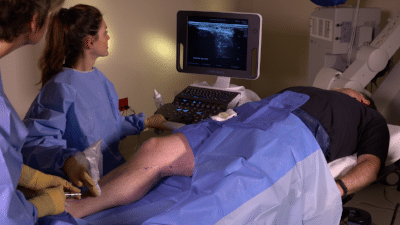
Leg Vein Surgery vs. In-Office Leg Vein Procedures
Varicose vein surgery not what it used to be
If you have heard—or experienced--stories about standard vein removal surgery that happened prior to the turn of this century, it is understandable if you are concerned about seeking help from a qualified vein specialist for your painful varicose veins. There was a time when leg vein surgery only referred to vein procedures such as vein stripping, ambulatory phlebectomy, and vein ligation, painful procedures, likely involving general anesthetic, and definitely involving long and difficult recovery times.
The good news is that there is no longer a need for concern. Today, there is a range of minimally invasive, maximally effective procedures that can have you back on your feet with a much improved quality of life in very little time. Many of these procedures can be performed in a clinic, on an out-patient basis, with local anesthetic.
If you are experiencing the discomfort of varicose veins, it is a great time to get assessed by a qualified vein specialist to ensure that you are not also experiencing the effects of Chronic Venous Insufficiency.
There are treatments for varicose veins besides invasive leg vein surgery
At Advanced Vein Institute of Arizona, we do not perform ligation or vein stripping. We consider those to be archaic and outmoded treatments. A qualified vein specialist at a modern vein clinic can assess your vascular health, and tailor a treatment plan to your specific needs, without the pain and discomfort of yester-year. Treatment options could include:
• Medical Adhesive: VenaSeal™ Closure System.: VenaSeal™ Closure System. The revolutionary, FDA approved VenaSeal™ procedure uses a medical grade adhesive to close off diseased superficial veins. Blood is re-routed to other healthy veins in the leg, and the hardened veins are gradually reabsorbed by the body.
• Laser Treatment: Endovenous Laser Treatment (EVLT). Endovenous Laser Treatment (EVLT). Endovenous Laser Ablation or Endovenous Laser Treatment (EVLA/EVLT) utilizes laser heat to ablate, or destroy, an incompetent saphenous vein. It usually takes about an hour, is minimally invasive, and can be performed in-office.
• Radiofrequency Ablation: ClosureFast Radiofrequency Procedure. ClosureFast Radiofrequency Procedure. Similar in approach to Endovenous Laser Ablation, radiofrequency ablation relies instead on radio frequency energy (electricity) to heat and collapse dysfunctional veins.
• Sclerotherapy. Sclerotherapy is a very commonly used to treat small varicose and spider veins. Using a very small needle, a chemical foam or liquid, called a sclerosant, is injected into the offending vein where it acts as an irritant, causing the vein walls to collapse and be dissolved by the body.
You don’t have to suffer from the symptoms of varicose veins. Book your consultation and full exam with a qualified vein specialist today.
Congratulations, you are pregnant! Your bundle or bundles of joy are on the way to change your life forever! The body changes quickly during pregnancy, and some of these changes are not so wonderful! Varicose veins are a common occurrence in pregnancy. There are a number of reasons for this: blood volume increases, hormones shift,…
Read More- « Previous
- 1
- …
- 13
- 14
- 15

